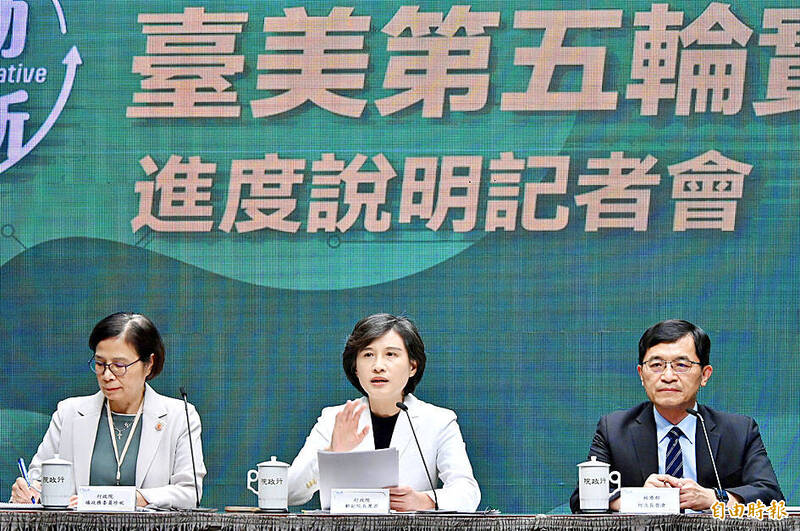Science
Taiwan Proposes High-Tech Partnership with US Amid Tariff Talks

Taiwan is actively pursuing a strategic partnership with the United States in the high-tech sector, as Vice Premier Cheng Li-chiun announced during a press conference in Taipei. This initiative coincides with ongoing discussions about reducing tariffs and increasing Taiwanese investments in the US, reflecting Taiwan’s significant trade surplus with the country.
Taiwan, home to the Taiwan Semiconductor Manufacturing Co (TSMC), the world’s largest contract chipmaker, is looking to expand its economic collaboration with the US. Currently, Taiwanese exports to the US face a 20 percent tariff, a figure that Taipei is eager to negotiate down. Cheng, who is leading the discussions, expressed optimism about achieving a consensus on expanding investment through a “Taiwan model” that focuses on enhancing production capacity in the US without relocating supply chains.
The proposed Taiwan model emphasizes “industrial investment planning” alongside government support initiatives, such as export credit guarantees and collaboration on industrial clusters. This strategy aims to create a win-win situation for both nations, fostering a mutually beneficial environment for investment and cooperation. Cheng explained that corporate owners would have the flexibility to choose their preferred industries for investment, allowing the government to align its support accordingly.
In discussing Taiwan’s technological advancements, Cheng highlighted that while Taiwan’s science parks may not be easily replicated abroad, the country is willing to share its expertise to help establish similar industry clusters in the US. This approach seeks to lower investment risks and operating costs for companies looking to enter the US market. Cheng clarified that this collaboration does not imply relocating Taiwan’s science parks to the US but rather fostering local development.
To facilitate the establishment of these industry clusters, Cheng urged the US to provide essential resources, including land, utilities, and infrastructure. Additionally, she stressed the importance of expediting legal frameworks and environmental assessments to support timely investment initiatives. The successful implementation of these conditions would require coordinated efforts from the industrial and financial sectors, along with government backing.
Beyond supply chain collaboration, Taiwan is also addressing tariff rates with the US. Cheng reiterated that Taiwan’s position is clear: the tariff rates would not be cumulative. Ongoing discussions include potential preferential rates for semiconductors and related products, as outlined in Section 232 of the US Trade Expansion Act of 1962. Despite multiple rounds of negotiations, the US Department of Commerce and the Office of the US Trade Representative have not provided comments regarding these talks.
TSMC, which is experiencing a surge in demand for artificial intelligence applications, is investing US$165 billion to develop chip manufacturing facilities in Arizona. Nonetheless, Cheng clarified that the majority of TSMC’s production will remain in Taiwan. She dismissed a recent proposal by US Secretary of Commerce Howard Lutnick for a “50-50 split” in chip production, affirming that Taiwan does not support such arrangements and that this topic was not raised during the latest discussions.
Taiwan’s negotiations focus on three key objectives: reducing the tariff rate, securing comprehensive preferential treatment for semiconductors and other products, and improving investment opportunities in the US. The current US tariff policy, implemented on August 7, 2023, sets Taiwan’s provisional tariff rate at 20 percent. So far, five rounds of talks have taken place this year, starting with a video conference on April 11 and followed by meetings in May, June, July, and early August.
The outcomes of these discussions hold significant implications for Taiwan’s economic landscape and its relationship with the US, as both countries aim to strengthen their positions in the global technology sector.
-

 World5 months ago
World5 months agoSouth Korea’s Foreign Minister Cho Hyun to Visit China This Week
-

 Business5 months ago
Business5 months agoStarling Bank Plans Secondary Share Sale, Targeting $5.4 Billion Valuation
-

 Top Stories5 months ago
Top Stories5 months agoMunsang College Celebrates 100 Years with Grand Ceremony
-

 World5 months ago
World5 months agoPAS Aims to Expand Parliamentary Influence in Upcoming Election
-

 Business7 months ago
Business7 months agoKenvue Dismisses CEO Thibaut Mongon as Strategic Review Advances
-

 Lifestyle6 months ago
Lifestyle6 months agoHumanism Camp Engages 250 Youths in Summer Fest 2025
-

 Sports6 months ago
Sports6 months agoDe Minaur Triumphs at Washington Open After Thrilling Comeback
-

 Sports7 months ago
Sports7 months agoTupou and Daugunu Join First Nations Squad for Lions Clash
-

 Top Stories7 months ago
Top Stories7 months agoColombian Senator Miguel Uribe Shows Signs of Recovery After Attack
-

 World7 months ago
World7 months agoASEAN Gears Up for Historic Joint Meeting of Foreign and Economic Ministers
-

 Health6 months ago
Health6 months agoNew Study Challenges Assumptions About Aging and Inflammation
-

 Business7 months ago
Business7 months agoOil Prices Surge Following New EU Sanctions on Russia









